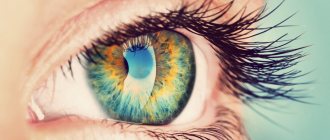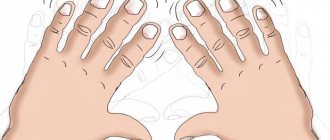- 22 JAN 17
- Vasilyeva Olga
- Articles
Author: Vasilyeva O.B.
In this article, you will learn about the psychological mechanisms behind trembling and how to cope with it.
Tremor that occurs with excitement is a normal physiological reaction of the body to stress. Almost every person has at least once felt trembling in stressful situations: during exams, in driving school or during public speaking.
But some people experience tremors more often and more severely than others. When trembling in the hands becomes noticeable, it begins to cause inconvenience: it is impossible to calmly eat soup, it is difficult to write legibly, and change at the cash register tends to fall on the floor. Tremor becomes a disaster for those whose work involves small precise movements: for shooting athletes, surgeons and dentists. Some public figures, teachers and actors struggle with trembling in front of an audience.
It happens that shaking in the hands is accompanied by a shaking neck and head. Shaky legs bother many novice drivers, and a shaky voice bothers lecturers.
In my first year at the institute, I met Veronica. She was a slender, pretty, slightly shy girl. Every time she answered at the board, her hands were noticeably trembling with excitement. And during the exams, the trembling intensified and covered the whole body.
During one of the subjects, we were given the task of approaching a stranger on the street and asking him the question “How to get to the Kremlin?” It so happened that we went to complete the task together with Veronica. Already going outside, Veronica began to shake. And when we chose the “candidate” to whom we would ask our question, my head began to visibly shake. Despite this, Veronica completed the task.
On our way back, Veronica and I started talking. She told me about herself.
“I started getting tremors in my hands when I was nervous at the end of school. At first the hand trembling was almost unnoticeable. But one day a “kind” classmate laughed at his shaking hands. From then on, I tried to control my trembling. And the more I tried to control my body, the stronger the tremor became. Now, when I get nervous, my hands shake.”
We became friends with Veronica. When she went to psychotherapy, she shared her discoveries with me. What I learned from Veronica about tremor later helped many of my clients.
Symptoms of trembling due to nervousness
Psychogenic shaking can manifest itself as follows.
- A person feels their arms, legs, abdomen, buttocks, back, and sometimes the whole body simultaneously shaking and vibrating. In this case, trembling can be both noticeable from the outside and felt only internally.
- If it starts in one part of the body, it can gradually spread throughout the body. The whole body becomes “nervous”, it vibrates. And the vibration can come from inside, or maybe from outside. Sometimes it occurs all over the body at once.
- The condition often worsens after sleep, whether it is a long night's rest or a short nap during the day. The period of going to bed, the desire to relax and rest can also serve as triggers for an attack.
- Nervous tremors can develop against a background of severe anxiety and panic. Or it can appear as if out of the blue, without obvious excitement.
- The intensity of the symptom can vary from internal trembling barely noticeable to the patient himself, to obvious shaking that is visible to others.
- An attack often has a wave-like course: it goes away, then comes back in a wave.
- Nervous tremors can occur only occasionally, or can plague a person throughout the day. Its intensity can vary from hour to hour, from day to day, from month to month. Sometimes a symptom may go away completely for several years, and then return again.
- Often the symptom is complemented by other bodily manifestations of anxiety. It could be palpitations, nausea, abdominal pain - anything. A state of intense psychogenic vibration, especially one that is noticeable externally, is usually accompanied by obvious excitement, fear, and often panic.
- Sometimes, during an attack, a person can stop trembling by saying something soothing to themselves and/or squeezing and relaxing their muscles. But sometimes there is no way to overcome the vibration. Both options may be characteristic of the same patient. And they can occur during the same attack, depending on the intensity of its waves.
- For some people, the trigger for development may be overexertion of certain muscle groups. But more often the occurrence of the symptom has nothing to do with physical activity.
Possible complications
Head tremor in itself is not dangerous. However, if it is a sign of a dangerous disease (traumatic brain injury, Parkinson's disease, brain tumor, stroke, other damage to the central nervous system), then lack of treatment can lead to death or disability.
Head tremor significantly reduces the quality of life of patients for the following reasons:
- musculoskeletal disorder (difficulty eating, speaking, writing, performing other simple actions);
- curvature of the neck;
- decline in professional skills;
- limitation of the range of head movement.
Involuntary oscillatory movements, or head tremors, occur as a result of contraction of the neck muscles. Anxiety, stress and increased workload are risk factors for this condition.
Tremor is also present in patients with neurological pathologies. To completely get rid of it, you need to contact a neurologist and conduct a full diagnosis to rule out organic brain damage, which can lead to disability and death.
The main cause of nervous tremors in the body
The main reason for the nervous vibration of the body is its preparation for “fight and flight.” In a state of anxiety, the body mobilizes internal resources so that it has the opportunity to enter into battle or escape. This is the oldest animal survival mechanism.
If anxiety is short-term, then defensive behavior does not last long. The body will turn on the stress response. The muscles will tense and possibly begin to tremble. But as soon as the threat disappears, everything will pass.
But if a person is in a state of chronic anxiety, sometimes without noticing it, his body is constantly in a state of semi-preparedness for fight and flight. And at any moment this half-readiness can turn into readiness. And obvious symptoms of overexertion will appear, including nervous tremors.
Moreover, the transition from a state of semi-readiness to overt defense can occur both against the background of increasing excitement, and seemingly out of the blue. For example, I went to bed. I tried to relax. But it turned out differently.
Precautionary measures
It is important to learn to keep yourself in balance, since it is a strong surge of emotions as a result of excitement that leads a person to about.
- If you are overly worried, then start drinking herbal teas. For example, you can brew a drink with lemon balm, mint, motherwort or verbena.
- It wouldn't hurt to take a bath with aromatic oils. Aromatherapy has a calming effect on the human body.
- Train yourself to sleep at least eight hours a day. Go to bed no later than eleven o'clock at night, get up no earlier than seven o'clock in the morning. Be aware of the effects that lack of sleep can have on your body.
- Pay attention to your diet. Remember that certain foods are not healthy and can also be harmful to the body, so avoid them.
- If you have a sedentary lifestyle or a sedentary job, then it is recommended to allocate a certain period of time to exercise.
- If you suspect any disease, consult a doctor in a timely manner, follow his recommendations, and do not neglect your health.
Now you know what to do if your hands start shaking during a moment of excitement. Remember that this phenomenon may be preceded by pathological processes in the body, therefore, if you cannot find a logical explanation for this phenomenon, be sure to visit a doctor so as not to miss the development of a serious illness.
source
Other causes of psychogenic tremors throughout the body
Chronic anxiety, leading to constant overstrain of the body, is the main reason for the development of nervous tremors. But there are other less significant reasons. Usually they simply complement the main one - constant preparation of the body for danger.
Internal vibration may intensify against the background of:
- consuming large amounts of caffeine;
- lack of sleep;
- dehydration;
- hyperventilation.
Excess caffeine, lack of sleep, and dehydration, in turn, can be consequences of a chronic anxiety state, enhancing its bodily manifestations. Hyperventilation almost always occurs with an anxiety disorder and worsens its physical symptoms.
Increased nervousness, internal trembling
Increased nervousness and internal trembling have various reasons. Therefore, to treat such conditions, we conduct a thorough diagnosis to identify the true causes of the manifestation. In this case, we are talking about the manifestation of increased nervousness, sensations of internal trembling in the body, sometimes trembling can be localized in certain areas of the body or trembling can be felt in the arm or leg. Such symptoms may indicate disorders of the nervous system, which are often associated with various nervous breakdowns and are caused by disturbances in the metabolic processes of the nervous system. Less commonly, such conditions are observed in neurological disorders or somatic diseases. To prescribe the correct treatment, it is necessary to establish the true causes of nervousness and tremors. This requires differential diagnosis.
Brain Clinic specialists have extensive experience in treating various disorders of nervous activity that cause feelings of increased nervousness and tremors. Our doctors will be able to correctly and safely restore the body’s functioning without any side or negative effects on it.
We help in the most severe cases, even if previous treatment did not help.
| Initial consultation and examination 2,500 | Therapeutic and restorative neurometabolic therapy from 5,000 |
How to quickly get rid of nervous tremors at home
Drink some water
Dehydration can cause shaking. People who are anxious are more likely to become dehydrated, as they may experience increased urination and/or sweating. However, in most cases, a few sips of water or tea have not so much a hydrating effect as a calming one.
Quite often the question arises, what is better to drink - hot or cold, just water or some other drink? The best thing to do is drink something that calms you down. For some it might be a glass of cold water, for others it might be a cup of hot cocoa.
Move over
If the muscles are trembling and require activity, they need to provide it. So get moving.
Exactly how you move depends on your preferences. Some people just like to walk around. Some people find rotational movements of their arms more helpful.
Physical activity can be anything, but not exhausting. Walk, but don't run. Rotate your arms, but don't push up.
Slow down your breathing
During preparation for “fight and flight,” a person’s breathing becomes more active. Hyperventilation occurs, which aggravates all the physical symptoms of anxiety, including nervous trembling.
So try to slow down your breathing. To do this, take a normal breath (not too deep), slowly count to 4 and only then exhale. Count to 4 again and only then inhale.
Continue breathing in this rhythm until you feel better.
Have trembling in certain parts of the body
During attacks, many people are frightened by the fact that they seem to lose control over their body: their arms and legs tremble, their teeth chatter, and nothing can be done about it. The growing fear of loss of control intensifies the nervous trembling.
Indeed, it can be difficult to quickly stop trembling throughout the whole body. But you can always take control of its individual sections. For example, give an order not to shake your hands or not twitch your thigh muscles.
Often the realization that the shaking is, in principle, controllable is reassuring. And thus helps relieve an attack.
Let go of the situation
The easiest and most effective way to stop shaking is to allow yourself to shake. The more you internally resist the shaking, the more the muscles tense and the stronger they contract.
Therefore, the most effective method of dealing with nervous tremors is to allow it to happen. Give your muscles the opportunity to do the work they need, and they will quickly relax. And the tremor will stop.
Ways to get rid of hand tremors
It is possible to get rid of hand tremors forever or for a long time if you accurately determine the cause.
To do this, you need to analyze your lifestyle and remove provoking habits from it - smoking, eating unhealthy foods, alcohol, coffee, doing physical exercise, taking time to rest, getting a good night’s sleep. You should also carry out a whole range of relaxing activities:
- massage;
- swimming in the pool;
- cold and hot shower;
- walks in the open air;
- listening to calm music.
Some experts suggest treating hand tremors with unconventional methods - bees and leeches (hirudotherapy). Most experts agree that these methods are outdated. More effective exercises are those aimed at fixing the fingers in a fist and developing fine motor skills. But they need to be done regularly.
Many problems come from the head. This also applies to tremor. Many people cannot get rid of it because they do not know how to relax and are too focused on themselves. Also, hands shake when a person thinks about it and worries about how it is perceived by others. Don't focus on this problem and it will gradually disappear.
If all of the above methods do not help, then you need to visit a neurologist. He will conduct a comprehensive examination and prescribe appropriate treatment.
Medications that may be prescribed include:
- vitamin complexes with group B and magnesium;
- Xanax and Clonazepam tablets;
- the drug "Primidon" in small doses;
- sedatives with motherwort and valerian;
- sedative medicine - "Novo-Passit";
- "Glycine".
There are several folk recipes that have proven effective in the fight against tremor:
- consumption of tansy fresh, it must be chewed;
- a decoction of herbs valerian, motherwort, hawthorn, chamomile, mint in equal parts;
- a decoction of unpeeled oat grains;
- soothing teas;
- baths with essential oils;
- diet with iodine-containing foods.
What to do at home to prevent an attack of nervous tremors
The main symptomatic prevention of an attack is associated with relaxation of the muscles, which in an anxious person are always in increased tone.
When an attack has already begun, doing muscle relaxation exercises is ineffective. And often impossible. But as a means of prevention, such techniques help.
You can accept:
- wet dog exercise;
- hanger exercise;
- abdominal muscle relaxation technique.
But what works best is the progressive muscle relaxation technique, which makes it possible to remove excess tone from all major muscle fibers at once.
Any other techniques and procedures that promote relaxation also work: massage, hot shower or warm bath, acupuncture, yoga, etc.
For autonomic dysfunction
Autonomic dysfunction is a complex of clinical manifestations of a functional disorder of the autonomic nervous system, which entails disruption of the functioning of internal organs. This is a specific syndrome that can accompany any somatic pathology.
Violation of nervous regulation on the part of the autonomic nervous system can be provoked by one of the following factors:
- burdened heredity;
- hormonal dysfunction;
- diseases of the endocrine system;
- organic brain lesions;
- unfavorable external factors leading to constant psycho-emotional stress.
Patients with autonomic dysfunction complain of rapid heartbeat, periodic feeling of a sinking heart, pain in the heart area. They are worried about rapid breathing, difficulty or inability to take a deep breath or exhale, a feeling of lack of air, and causeless attacks of shortness of breath. There are fluctuations in blood pressure, a feeling of coldness in the extremities, and periodic fluctuations in body temperature. The functioning of the digestive organs is disrupted - abdominal pain, constipation alternating with diarrhea, nausea, vomiting, and belching occur.
Patients note general weakness, decreased performance, and lethargy. They experience excessive irritability, impaired sleep quality, frequent dizziness, a constant feeling of anxiety, and periodic trembling within the body. Diagnosis of autonomic nervous system dysfunction is often difficult.
At the Yusupov Hospital, doctors conduct a comprehensive examination, including registration of an electrocardiogram, rheovasography, rheoencephalography, computer and magnetic resonance imaging. Patients in the neurology clinic are advised by cardiologists, endocrinologists, and gastroenterologists.
To treat autonomic dysfunction, neurologists use medication to relieve acute attacks. Patients are prescribed herbal medicines, physiotherapeutic procedures that improve sleep quality, diet therapy and physical therapy. Psychologists use innovative psychotherapeutic techniques.











